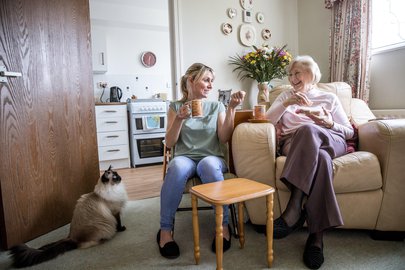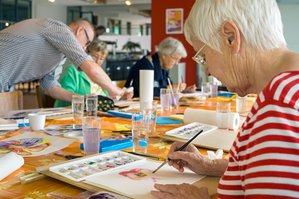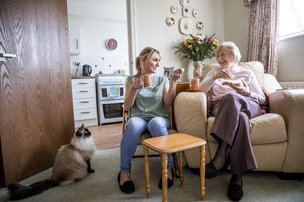
During the Coronavirus pandemic, it is incredibly important that we do all that we can to look out for others, particularly those who are vulnerable which includes people living with dementia.
If you are the carer of someone who has dementia, understandably you may be worried about keeping them safe & well during these challenging times.
What is Coronavirus?
Coronavirus, also known as COVID- 19, is a new highly contagious virus which affects your lungs and airways. The symptoms of the virus often consist of a dry cough, a fever and shortness of breath. People who are aged above 70, have a long-term health condition or have a weak immune system are likely to develop worse symptoms which can be fatal.
Does dementia increase a persons' risk of contracting Coronavirus?
No evidence currently suggests that having dementia increases a persons' risk of developing Coronavirus. However, forgetfulness is a common symptom of dementia meaning people with dementia are more likely to forget to wash their hands regularly, the most effective way of us preventing ourselves from the virus.
5 Ways of Keeping People with Dementia Safe
We have put together 5 ways you can ensure that your loved one with dementia is kept safe during the difficult times of the Coronavirus pandemic.
1. Regularly clean surfaces & door handles
Use a cleaning spray, wipe or diluted bleach solution to regularly wipe down surfaces and handles around the home. This is a necessary measure that we must all take during the Coronavirus pandemic to prevent the spread of the virus.
2. Make sure they have the medication they need
If you're self-isolating, ensure that your loved one with dementia has all of the medication that they require for the next few weeks. If you are worried about running out of medication whilst isolating, it is advisable that you to speak to your loved one's GP who may be able to arrange for a higher quantity of medication to be prescribed.
The NHS are appealing for 250,000 "NHS volunteers" to help national health service employees. One of the tasks that these volunteers will be able to support the NHS with will be the delivery of prescriptions to those who are self-isolating. Therefore, you may even be able to have your prescriptions delivered to your home.
3. Encourage physical & mental activities

We must all remain as active as possible even whilst we are self-isolating. We recommend that you encourage your loved one to take part in some gentle exercises in the home or the garden whilst practising social distancing. If you are lacking inspiration for workouts, Youtube is a brilliant source for virtual workout routines.
To keep your loved one engaged along with a sense of wellbeing, plan out activities that you can do together indoors. You can tailor activities to their interests, hobbies and of course, their cognitive ability as this will vary depending on the stage of their dementia. People with dementia often connect well with music so you could listen and sing-along to songs by their favourite artist or even get the instruments out for a jam! Read more about music & dementia here.
4. Make sure you have enough handwash & sanitiser to keep you going whilst self-isolating
Washing hands regularly and thoroughly will greatly reduce a persons' risk of getting Coronavirus. It is recommended that we wash our hands for at least 20 seconds with soap, particularly after using the bathroom, before eating and after blowing your nose, sneezing or coughing. The virus is a fat (lipid) and soap breaks down fat which is why it is so effective. Boris Johnson, Prime Minister, has advised a good way of timing washing our hands is to sing Happy Birthday twice! Encouraging someone who has dementia to sing a particular song when washing their hands could help them to remember to do it regularly.
If you are worried about your loved one forgetting to wash their hands regularly, you can place written reminders on sticky notes around the house in key areas such as one that says "remember to wash your hands for 20 seconds" on the bathroom mirror.
Handwashing with soap is preferable but if you are using hand sanitiser instead, please ensure that you are using an alcohol-based one with at least 60% alcohol.
5. Make arrangements in advance for what happens if you as the Care Giver becomes unwell
You must prepare for the dreaded instance that you become ill with the Coronavirus. Make arrangements for someone else to care for the person you are a Care Giver for so that if this happens, your loved one is not left without the care & support they need daily.
We hope that you all stay well & safe! Please let us know if there is anything at all we can do to help you.
Are you looking for care for yourself or a loved one? Please get in touch with us today for free help & support!
Call us on 01865 638018
Send message

